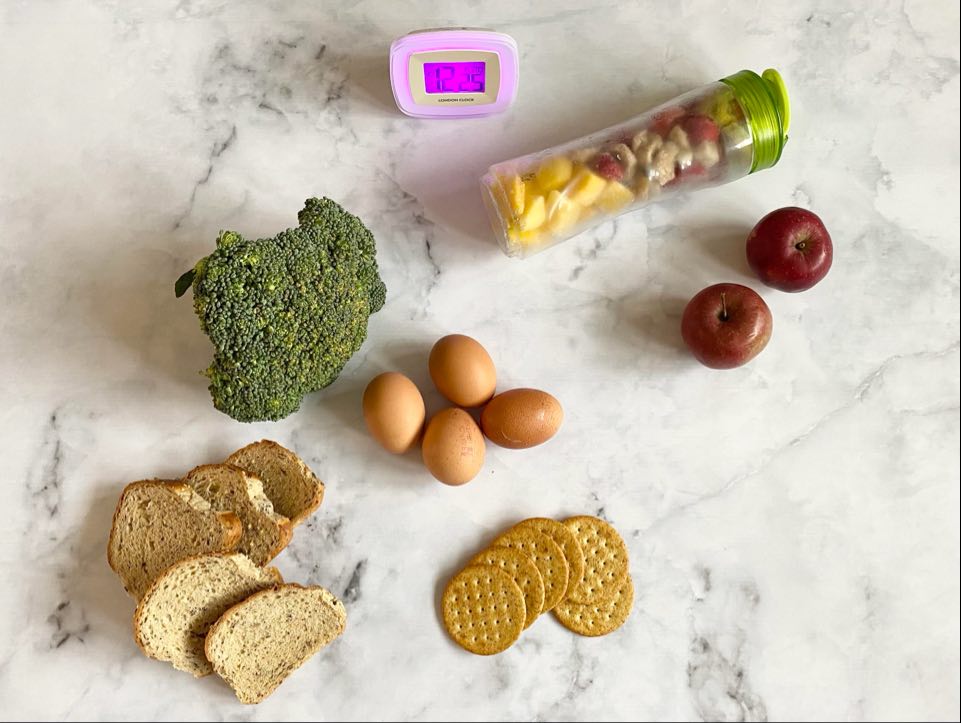I never realised until I started researching and looking into Menopause and digestive issues that gut health was so important during the Menopause and that it could have such a huge link to digestive issues. With our fluctuating hormone levels during perimenopause and declining levels of Oestrogen and Progesterone as we go through this transition time, there is no doubt in my mind that the gut is disrupted, and digestive problems set in!
Please be aware that this blog post contains affiliate links and any purchases made through such links will result in a small commission for me (at no extra cost to you).
Menopause and Digestive Issues
Before the Menopause I could eat what I wanted and pretty much never had a problem with what I ate or drank. Fast forward to my Perimenopause, Menopause and now Post Menopause years and it was/is a whole different game! Personally, I never gave a thought to any stomach issues with the Menopause, we all think about hot flushes, bad sleep, irregular periods etc but now, I look at it all with a totally different perspective.
Click here to read more blog posts from the menopause lounge.
Morning Sickness/Nausea:
When going through Perimenopause, hormones are beginning to change, this can include changes to the FSH (Follicle Stimulating Hormone) which basically regulates ovary function. It works similarly to the early stages of pregnancy, hence the association to morning sickness. Lots of women say they wake up in the morning feeling nauseous when they are approaching the Menopause and have the feeling they might have had when they were first pregnant.
Declining Oestrogen levels can also cause Cortisol (the body’s main stress hormone) to increase, raising blood pressure and reducing acid in our stomach, the result of which we end up with a poorly and upset stomach.
What can we do to avoid/stop this?
- Wake up earlier – Setting an alarm 30 minutes earlier giving your hormone levels extra time to settle as opposed to jumping up out of bed and rushing into your morning routine, should leave your stomach feeling much better. This Lumie Sunrise alarm slowly lights up your room to gently wake you up in the morning!
- Eat breakfast – This is vital and will get those perimenopause digestive issues under control; a balanced healthy breakfast will stabilize your blood sugar levels and give you fuel for the day to keep you going and keep the nausea at bay.
- Chew properly – If you chew your food slowly and thoroughly, this will allow the food to be digested properly and make the body work less hard trying to digest it.
- Keep hydrated – Drinking water whilst eating your breakfast will help with nutrient transportation.
- Hate breakfast? – If like me, you cannot eat so soon as you get up, a smoothie is a good alternative breakfast to have. This smoothie book below is great for different smoothie recipes!
Menopause and Digestive Issues:
Oestrogen stimulates the muscle that lines the intestine, Progesterone has a relaxing effect on it, which work hand in hand together. But during the Menopause, this is thrown out of its perfect pattern and is disrupted, resulting in, bloating, wind, indigestion, constipation, and diarrhea. With Oestrogen dropping, the gut can be disrupted and can affect our food and waste products. Leaving us bloated, having constipation or diarrhoea and for some Menopausal women, water retention and bloating which go hand in hand and are a persistent problem.
Click here to read out blog on Menopause and Joint pain
Menopausal Stomach Issues, Anxiety and Stress:
When our Cortisol runs low during the Menopause, blood pressure rises and our digestion slows down, without our Oestrogens calming effect, adrenaline rises which in turn switches off our digestive function. This leaves us with sluggish bowels, stomach pains, cramps, bloating and constipation. If you suffer with anxiety during the Menopause (it is a very common symptom of the menopause) it is very easy to become flustered and stressed and feel you are not coping in stressful situations, this can cause tension and leave your stomach in knots.
I never realised the link to the brain and gut, so if you have a Menopausal upset stomach, it is worth checking out those tension levels, down to those pesky hormones again! The link between our mind and stomach means that any stress/anxiety issues we have, are going to be mirrored in our stomachs, and the muscles in the gut then becoming tense.
Menopausal Upset Stomach?
Along our intestine, there are a multitude of bacteria activity, and these are known as the Microbiome. Our Microbiome needs the right type of friendly bacteria to support our gut function and maintain our bowel movements. This plays an important role in keeping a Menopausal upset stomach at bay. These friendly bacteria produce vitamin B which is absorbed into our body, and this contributes to a normal energy metabolism, required for all our body functions and activities, particularly exercise.
This audible book “The Microbiome Solution” is a great read and I would highly recommend!
What can we do to help with these Menopause and Digestive Issues?
- HRT (Hormone Replacement Therapy) – can provide relief from Menopause stomach issues.
- Eat healthily – Phytoestrogens (Plant Compounds) mimic the effects of Oestrogen and can help balance hormones and help with digestive issues. These include:
Legumes – Chickpeas, lentils and beans.
Nuts – Almonds, cashews and peanuts.
Seeds – Sesame, sunflower, pumpkin.
Whole grains – rye, barley, oats, bran, granola, muesli, whole wheat.
Soya Products – Yogurts, milk, flour, beans.
Fiber – Broccoli, spinach, apples, cauliflower, whole grains.
Omega-3 – Walnuts, egg yolks, salmon, mackerel, sardines, pilchards.
- Spices – Turmeric, great is an anti-inflammatory and can sooth and protect the stomach from acid.
- Fennel, cardamom, and caraway can also help with digestive issues. Great for combating wind and bloating.
- Sit down and eat – Eating on the go is not good for your digestion, sit down and chew your food and enjoy it!
- Do not chew gum – This can cause air to move in the wrong direction, causing you to burp.
- Peppermint tea – Drinking peppermint, chamomile and ginger tea can help with nausea and soothe your digestive system.
- Water – Good hydration is so important with digestive issues, and water will dilute acids that cause indigestion.
Supplements that may help with Digestive Issues:
Probiotics can also aid digestive and help support your body’s natural gut bacteria.
Always check with your GP before taking supplements as they can interfere with medication.
*DISCLAIMER*This page does not provide medical advice; it is intended for informational purposes only and is based upon my opinion and experiences. It is not a substitute for professional medical advice, diagnosis or treatment. Never ignore professional medical advice in seeking treatment because of something you have read on The Executive Menopause Coach website. Always seek professional medical advice.











[…] Nausea and Digestive Issues – With increased cortisol levels and decreased oestrogen levels, excessive bloating, nausea, stomach pain and flatulence can occur. […]